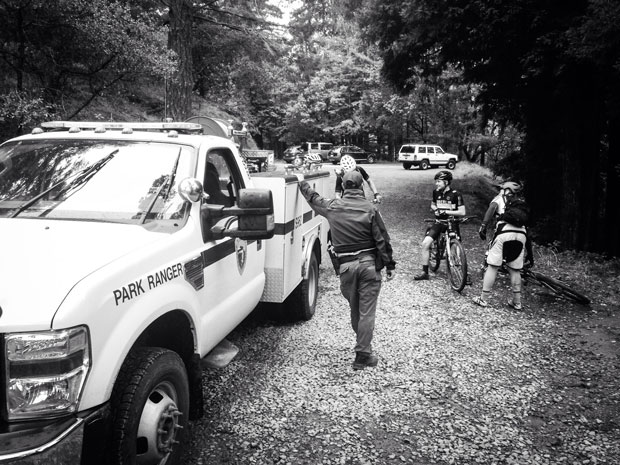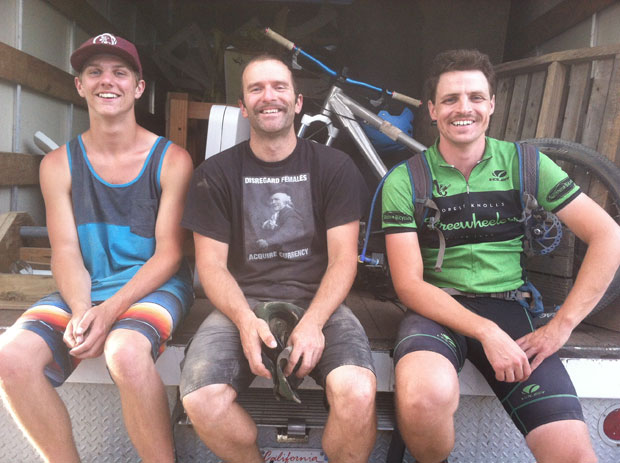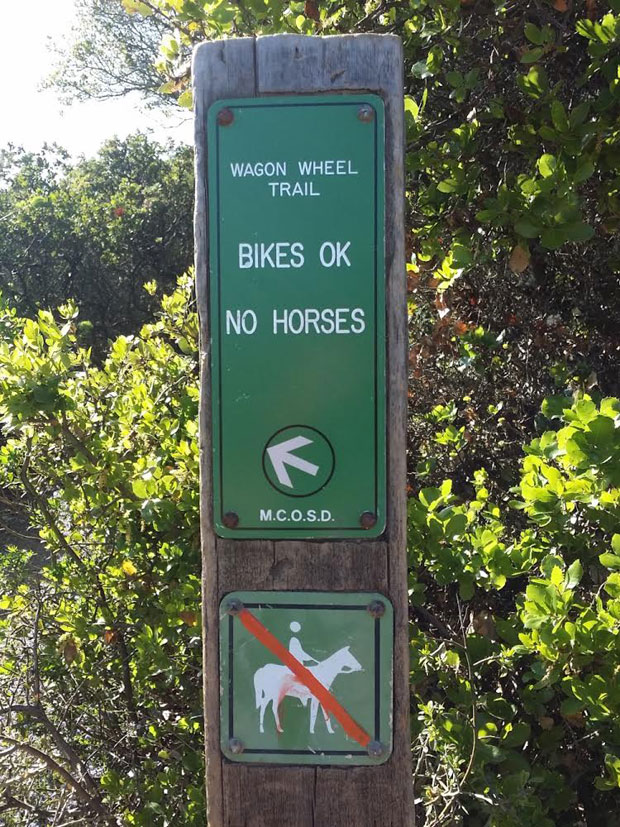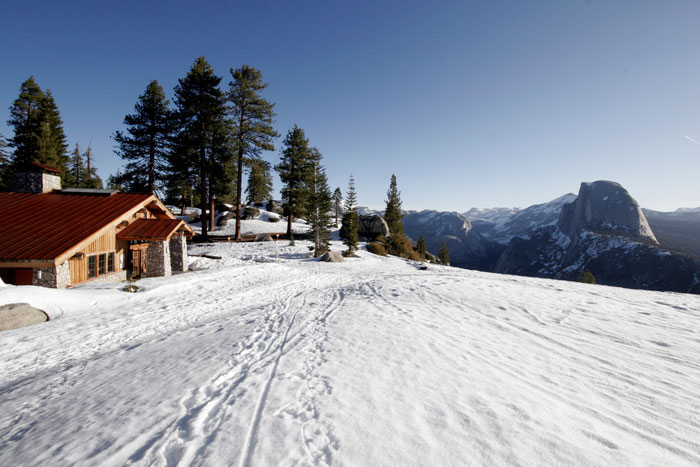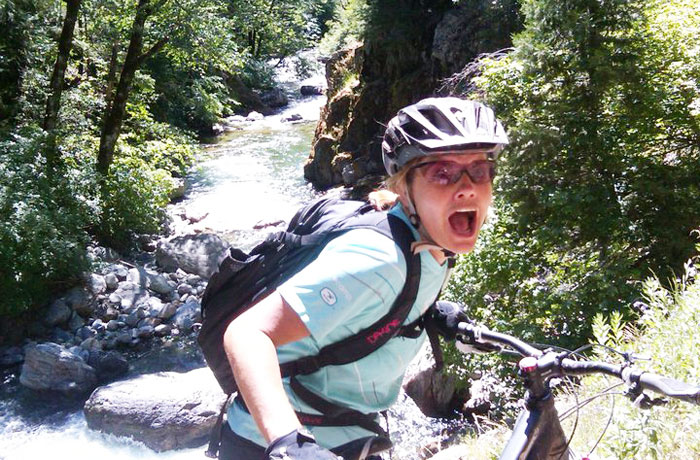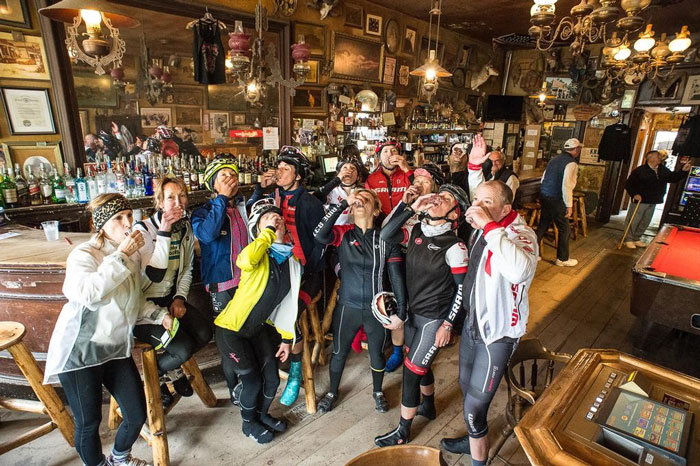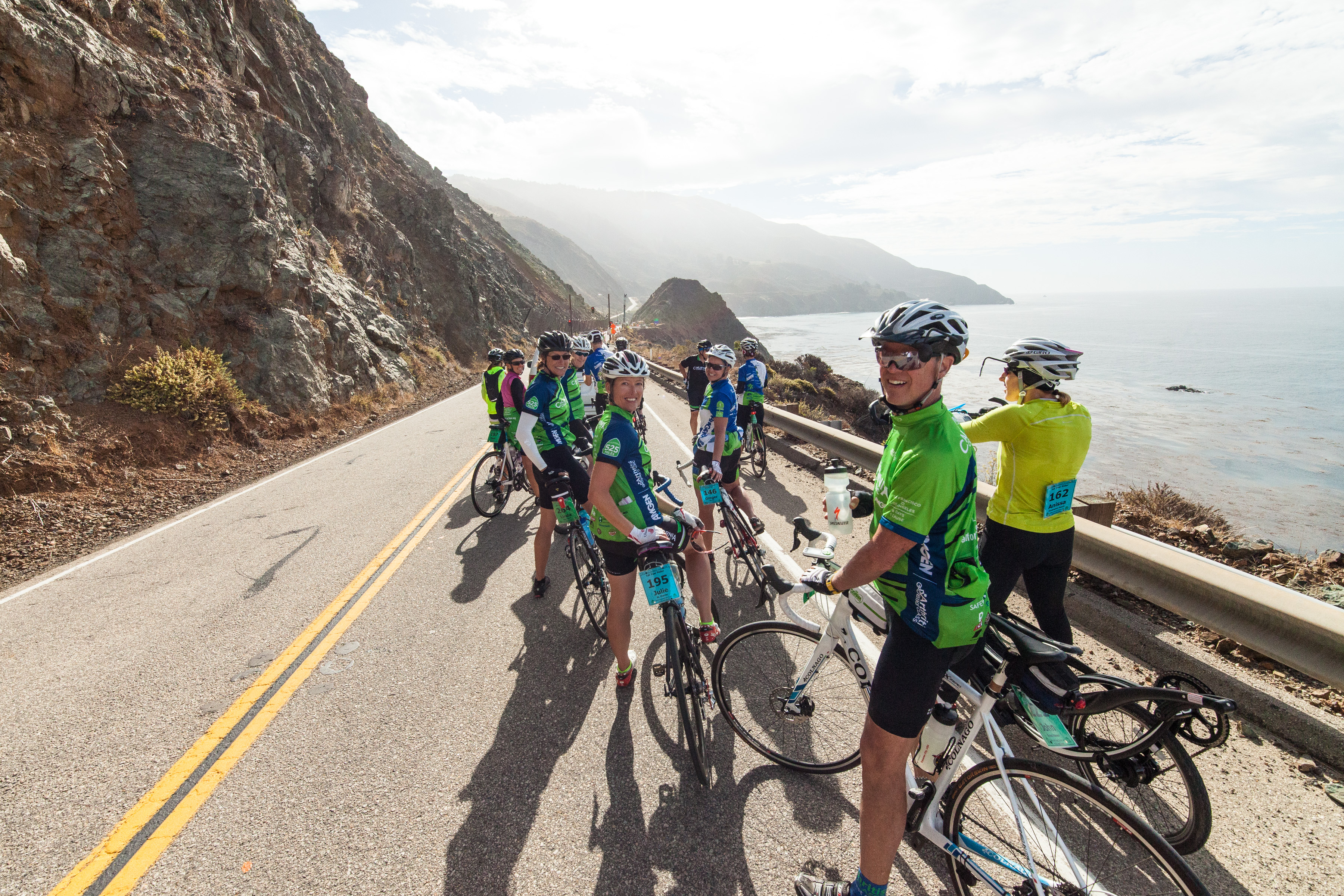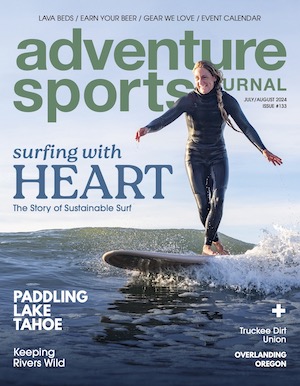- Josh Daiek: Boom and Bust - 03/19/2024
- Reconnecting the Past - 05/15/2023
- Striking Paydirt - 07/19/2022
Equal access to multi-use trails builds a strong and vibrant community, so why doesn’t this exist in the birthplace of mountain biking?
By Kurt Gensheimer
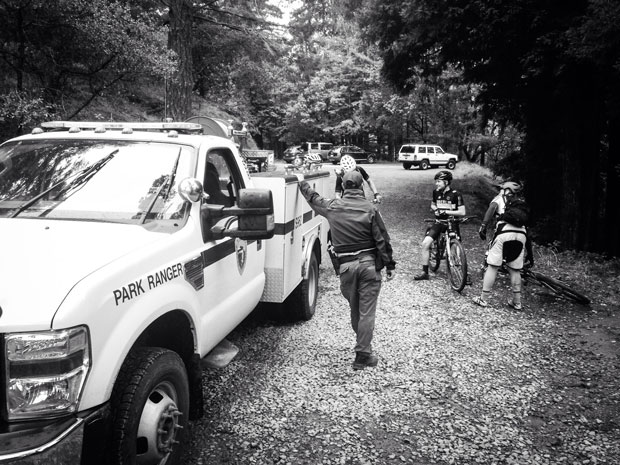
There is a strange dynamic between mountain bikers and park rangers in Marin. The fact that this ranger declined to have his photo taken with them indicates a serious image problem. Photo: James Adamson/dropmedia.tv
Davey Simon grew up an outlaw on the hallowed grounds of mountain biking’s birth, Marin County. He wasn’t an outlaw because he shoplifted or vandalized public property. He never spent time in a juvenile detention. He was a straight-A student. Simon was an outlaw because he rode his bicycle on public trails built on public land for public use. In most parts of the country, mountain biking on public lands is completely legal, but in Marin County, gaining equal trail access has been a decades-long struggle that continues to this day.
Now in his late thirties, Simon has been doing a lot less mountain biking than he used to. When he’s not busy with his career as a professional pilot, Simon is working hard on helping build projects like Tamarancho Flow Trail, developing youth cycling programs and joining other mountain bike advocates at Marin County Open Space District (MCOSD) meetings regarding the Road and Trails Management Plan (RTMP).
This type of exclusion is nothing new for Marin residents and mountain bikers like Simon. According to local trails advocacy group Access4Bikes, out of 177 miles of trail on MCOSD lands, only 10.9 miles – or a paltry 15 percent – is legal for mountain bikes. Especially confusing when looking at a recent MCOSD survey conducted at a trailhead not open to bikes, showing mountain bikers as the second biggest user group behind hikers. Even more confusing is the fact that equestrians account for less than one percent of users, yet they have access to 88 percent of MCOSD trails. And Simon is convinced that if the survey were conducted at a trail open to all users, mountain bikers would be the majority.Passed in December 2014, the RTMP is the biggest land-use revision in MCOSD history; serving as a future roadmap as the county comprehensively updates trail access standards. And for the first time ever, the RTMP includes mountain bikers as a user group. Before the RTMP’s passing only a few months ago, the birthplace of mountain biking automatically outlawed bikes on all public trails unless it was signed specifically as a bike-legal trail.
“The mission statement of Marin County Parks specifically states ‘…providing recreational opportunities for the enjoyment of all generations,’ but the numbers speak for themselves,” said Simon. “In Marin County, dogs have more access to public land than mountain bikers do, which would be a depressing fact if it wasn’t so funny.”
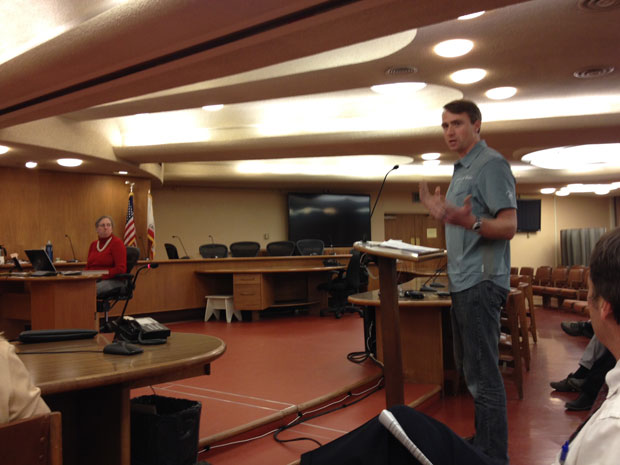
The guts of A4B’s work: in the trenches at a Board of Supervisors meeting advocating for more trails. A4B board member Andrew Galbraith.
The reason why is complicated to say the least, and has been a paralyzing source of frustration for Marin mountain bike advocacy organization, Access4Bikes. Mountain bike advocates have worked tirelessly for years to try and bring this anti-mountain bike sentiment to light, but it seems for every step forward that mountain bikers take, something happens that pushes them two steps back.
“For decades, opponents of mountain bikes cried they were environmentally destructive, but numerous third-party studies have completely disproven the issue of environmental destruction,” said Vernon Huffman, Access4Bikes President. “The truth is; water and runoff does more damage than any user group can. The solution isn’t banning a user group; it’s building sustainable multi-use trails with good drainage.”
Once Huffman and mountain bike advocates in Marin presented these third-party environmental studies to the MCOSD, thinking they successfully put the issue to bed, another curveball came their way from mountain bike opponents.
“Suddenly the story went from environmental destruction to a safety issue,” said Huffman. “Opponents claimed that mountain biking was a dangerous activity that put other trail users at risk.”
Access4Bikes looked further into the safety claim brought up by the Marin Conservation League (MCL) and Marin Horse Council (MHC), and after pulling five-years of filed trail-use incidents from the MCOSD, they could only find a single incident that involved a couple of mountain bikers and equestrians. The only problem was the mountain bikers weren’t mountain bikers; they were pre-teen kids on BMX bikes.
In a story that blew up publicly, two women were riding rented horses on Big Trees Trail near Willow Tree Stables in Novato – a trail illegal to mountain biking – when they encountered two alleged mountain bikers who allegedly whipped past them without stopping. One of the horses was spooked and threw its rider, resulting in spinal injuries to the rider, sending her by helicopter to the hospital.
“It was the absolute worst timing and the perfect fuel opponents needed to stoke the safety issue fire,” said Huffman. “The real tragedy is, these riders weren’t even mountain bikers. They were just some kids.”
But this wasn’t the only incident with horses on Big Trees Trail. Only a year previous, an almost identical incident happened involving a loose dog that spooked two horses, sending their riders to the hospital with injuries. But because the incident involved a dog and not bikes, the story was quickly and conveniently forgotten.
“Equestrians have the responsibility of properly training their horses before taking to any public trails,” said Jackson Ratcliffe of Access4Bikes. “A properly trained animal weighing nearly a thousand pounds with a mind of its own shouldn’t be so easily spooked by children or a dog, and if it is, the burden of safety should fall on the horses’ owners, not other trail users.”
Despite showing only a single trail user conflict in five years of filed incidents through the MCOSD – a conflict that was wrongfully pinned on mountain bikes – the nonexistent safety issue has become the biggest hurdle for mountain bike advocates in Marin. And why the MCOSD continues to entertain these unfounded safety claims by the MCL and MHC dumbfounds avid mountain bikers like Simon.
“After laying all the facts out on the table, the only conclusion a sensible person can make is that the MCOSD has a strong and passionate bias against mountain bikers,” said Simon.
The incidents at Willow Tree Stables spurned further investigation. Willow Tree Stables is one of a handful of horse ranches operating for-profit trail riding businesses on MCOSD land. In order to operate on public lands, there are a series of permits that must be secured. Access4Bikes examined the permits on file and made an interesting discovery. Out of five stables publicly advertising trail rides, none of them had commercial use permits. Operating without a permit is a misdemeanor offense with huge associated fines.
When presented to the MCOSD, they responded using the ongoing RTMP process as the reason why they were not following established Marin County Code of Ordinances, stating “We have given notice to the stables and tour operators that at some date in the near future we will engage them and others in a process to set up this system.”
“I have never heard of a single ranger ever stopping a group of horses to check and see if they have their permits,” said Simon. “But if mountain bikers are seen on an illegal trail, suddenly a gaggle of rangers give chase on ATVs. Is this really how we should be spending tax dollars? How about we start by making sure every commercial operation doing business on public land is paying for their use of it.”
After a painfully drawn-out, four year long process, Huffman is “carefully optimistic” of the RTMP outcome, considering it a crucial step for Access4Bikes in the eventual achievement of equal and rightful mountain bike access. Simon, on the other hand, isn’t so sure.
“Trail users opposed to expanded mountain bike access are scared,” said Simon. “For decades they’ve had exclusive access to public lands and they can’t possibly accept the concept of having to share, so they will continue to publicly paint mountain bikes in a negative light.”
Although Access4Bikes was able to overturn some specific anti-mountain bike legislation proposed in the RTMP, bike advocates suffered a big hit with the closing of access on all existing social trails. Social trails typically start as game trails, and over time, become adopted by hikers, mountain bikers and equestrians. Because there are so many miles of social trails in Marin County, classification and enforcement was nearly impossible. For mountain bikers who knew the law, it was the last sanctuary of singletrack riding they could enjoy without risk of being ticketed.
The RTMP now states that all social trails are off-limits to both mountain bikes and equestrians; a huge loss in Simon’s view of what little singletrack access there previously was. The only saving grace is that the RTMP is not a decision; it’s a template and guideline for the future that’s open to interpretation. But considering the historical track record of access to public lands in Marin County, Simon thinks mountain bikers shouldn’t be celebrating victory anytime soon.
“Based purely on their mission statement of ‘…providing recreational opportunities for the enjoyment of all generations,’ the MCOSD is failing to fulfill their duties as a public agency. How much longer can this continue?”
Now that the RTMP is complete and work has already begun on reclassifying trails in the MCOSD, the next big challenge for Access4Bikes lies within the Marin Municipal Water District. As the largest landowner in Marin with the most trails, MMWD does not have a single legal trail for bikes.
“It’s the Holy Grail,” said Huffman. “And we’re going to make sure that all MMWD directors elected understand our position.”
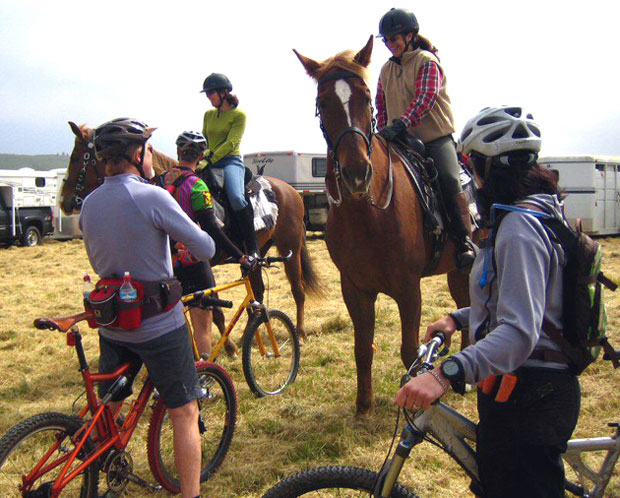
Carrot Fest photo courtesy Mountain Bikers of Santa Cruz.
Getting Along
By Michele Lamelin
In Santa Cruz County there is a long history of cooperation between the equestrian and mountain biking communities. Both groups recognize that by working together, they can promote enjoyment of the outdoors in a safe and harmonious manner. This isn’t to say it’s all a bed of roses. Occasionally there’s a flurry of frustration vented on the mountain bike forums about “road apples” on the trail. And there is the sporadic incident of a disrespectful mountain biker who leaves a horseman fuming.
But by and large, the spirit of cooperation runs high and is a source of pride between user groups in the Santa Cruz area. Local mountain bikers are sensitive to supporting equestrians on the trail, with seasoned riders educating those new to the sport about right of way and what to do when encountering a horse. “Horse up!” is followed by mountain bikers moving swiftly but calmly to the downside of the trail so the horse can comfortably pass by. “Have a good ride!” and smiles are bandied about, and each user group continues on their way after a considerate exchange.
Chloe Pelot, who rehabilitates horses at Mending Hearts Horse Advocacy in Felton, points out the importance of preparing a horse for any situation, whether a mountain biker is coming down the trail, the wind picks up and branch comes down, or any myriad of things that can spook a horse. Chloe explains, “It’s important to understand your horse from his perspective as a herd and prey animal, and to take responsibility for working with him in a way that helps him feel confident and secure in all situations.”
Mountain Bikers of Santa Cruz (MBoSC) Equestrian Liaison Lindsay Overton is an ardent mountain biker who also volunteers as horse patrol for California State Parks and is a member of the Santa Cruz County Horseman’s Association (SCCHA). Lindsay points out that a number of Santa Cruz equestrians are also mountain bikers, with more joining those ranks regularly. She explains how equestrians and mountain bikers recently joined forces to get a new multi-use, family-friendly trail approved and constructed in the heart of Santa Cruz. Lindsay credits the trail’s namesake—local trail building legend and avid equestrian Emma McCrary—for inspiring the harmony on Santa Cruz trails, saying “Trail blazer Emma McCrary devoted her life to developing trails in the Santa Cruz area for ALL to enjoy. Her spirit lives on in the cooperative relationship between our local mountain biking and equestrian communities.” ![]()

